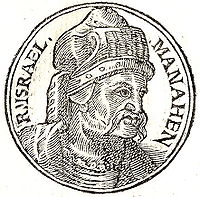- Menahem
-
Kings of Ancient Israel - Saul • Ish-bosheth
- David • Solomon • Rehoboam
- Jeroboam I • Nadab
- Baasha • Elah
- Zimri
- Omri • Ahab • Ahaziah • Joram/Jehoram
- Jehu • Jehoahaz • Joash/Jehoash • Jeroboam II • Zechariah
- Shallum
- Menahem • Pekahiah
- Pekah • Hoshea
- For the Khazar ruler of the same name, see Menahem (Khazar). For the medieval poet and philologist, see Menahem ben Saruq.
Menahem, (Hebrew: מְנַחֵם, Modern Menaẖem Tiberian Menạḥēm, from a Hebrew word meaning "the consoler" or "comforter"; Greek: Manaem in the Septuagint, Manaen in Aquila; Latin: Manahem; full name: Hebrew: מנחם בן גדי, Menahem Ben Gadi) was a king of the northern Israelite Kingdom of Israel. He was the son of Gadi, and the founder of the dynasty known as the House of Gadi or House of Menahem.
Menahem's ten year reign is told in 2 Kings 15:14-22. When Shallum conspired against and murdered Zachariah in Samaria, and set himself upon the throne of the northern kingdom, Menahem refused to recognize the usurper. Menahem marched from Tirzah to Samaria, about six miles westwards, laid siege to Samaria, took it, murdered Shallum a month into his reign (2 Kings 15:13), and set himself upon the throne. (2 Kings 15:14) According to Josephus, he was a general of the army of Israel.[1]
Menahem became king of Israel in the thirty-ninth year of the reign of Azariah, king of Judah, and reigned for ten years. (2 Kings 15:17) According to the chronology of Kautsch,[2] he ruled from 743 BC; according to Schrader, from 745 – 736 BC. William F. Albright has dated his reign from 745 – 738 BC, while E. R. Thiele offers the dates 752 – 742 BC.[3]
He brutally suppressed a revolt at Tiphsah.[4] He destroyed the city, which has not been located, and put all its inhabitants to death, even ripping open the pregnant women. (2 Kings 15:16) The Prophet Hosea describes the drunkenness and debauchery implied in the words "he departed not from the sins of Jeroboam." (2 Kings 15:18 and Hosea 7:1-15)
Menahem seems to have died a natural death, and was succeeded by his son Pekahiah.[5]
The author of the Books of Kings describes his rule as one of cruelty and oppression. The author is apparently synopsizing the "annals of the Kings of Israel", (2 Kings 15:21) and gives scant details of Menahem's reign.
Tributary of Assyria
Tiglath-Pileser III of Assyria began his reign in 745 BC three years before Menahem became king of Israel.
During Menahem's reign, the Assyrians first entered the kingdom of Israel, and had also invaded Aram Damascus to the north-east: "And Pul, king of the Assyrians, came into the land". (2 Kings 15:19) The Assyrians may have been invited into Israel by the Assyrian party. Hosea speaks of the two anti-Israelite parties, the Egyptian and Assyrian. (Hosea 7:11)
To maintain independence, Menahem was forced to pay a tribute of a thousand talents of silver (2 Kings 15:19) - which is about 37 tons (about 34 metric tons) of silver. It is now generally accepted that Pul referred to in 2 Kings 15:19 is Tiglath-Pileser III of the cuneiform inscriptions. Pul was probably his personal name and the one that first reached Israel. Tiglath-Pileser records this tribute in one of his inscriptions.
To pay the tribute, Menahem exacted fifty shekels of silver - about 1 1/4 pounds or 0.6 kg - from all the mighty men of wealth of the kingdom. (2 Kings 15:20) To collect this amount, there would have had to be at the time some 60,000 "that were mighty and rich" in the kingdom.
After receiving the tribute, Tiglath-Pileser returned to Assyria. However, from that time the kingdom of Israel was a tributary of Assyria; and when Hoshea some ten years later refused to pay any more tribute, it started a sequence of events which led to the destruction of the kingdom and the deportation of its population.
References
- ^ Antiquities of the Jews. 9:11:1 at WikiSource
- ^ Hist. of O.T. Literature, 185
- ^ Edwin Thiele, The Mysterious Numbers of the Hebrew Kings, (1st ed.; New York: Macmillan, 1951; 2d ed.; Grand Rapids: Eerdmans, 1965; 3rd ed.; Grand Rapids: Zondervan/Kregel, 1983). ISBN 0-8254-3825-X, 9780825438257
- ^ Tiphsah is the name in the Masoretic text. Modern commentators and translators prefer the reading Tappuah, following the Lucian recension of the Septuagint
- ^ 2 Kings 15:22
Source
- "Manahem". Catholic Encyclopedia. New York: Robert Appleton Company. 1913. http://www.newadvent.org/cathen/09583a.htm.
 This article incorporates text from a publication now in the public domain: Herbermann, Charles, ed (1913). "Manahem". Catholic Encyclopedia. Robert Appleton Company.Menahem
This article incorporates text from a publication now in the public domain: Herbermann, Charles, ed (1913). "Manahem". Catholic Encyclopedia. Robert Appleton Company.MenahemRegnal titles Preceded by
ShallumKing of Israel
752 – 742 BCSucceeded by
PekahiahIsraelite kings and Kings of the Jews Family tree of kings of Israel and JudahPre-dynastic United Monarchy Israel (Northern Kingdom) Judah (Southern Kingdom)
(House of David)Hasmonean dynasty Simon Maccabaeus · John Hyrcanus · Aristobulus I · Alexander Jannaeus · Salome Alexandra · Hyrcanus II · Aristobulus II · Hyrcanus II · Antigonus II MattathiasHerodian dynasty Antipater the Idumaean · Herod the Great · Archelaus · Antipas · Philip the Tetrarch · Salome I · Agrippa I · Agrippa IIitalics indicate a disputed reign or a non-royal titleCategories:- Kings of ancient Israel
- Kings of ancient Judah
- Monarchs of the Hebrew Bible
- 8th-century BC biblical rulers
Wikimedia Foundation. 2010.

